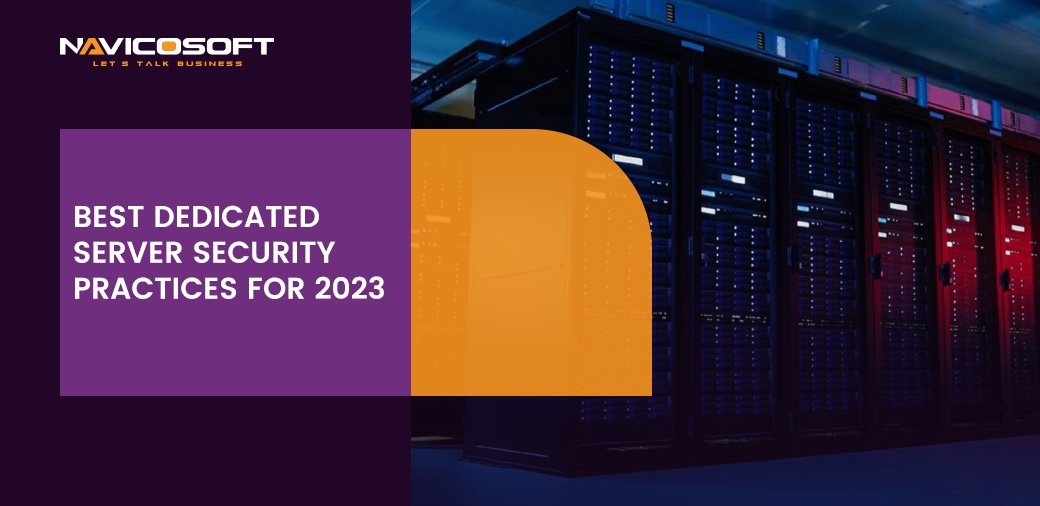Ensuring the security of your dedicated server is paramount in an era marked by rising cyber threats. A dedicated server hosts crucial data and applications, making it a prime target for hackers. Adopting dedicated server security practices to safeguard your digital assets is vital. In this article, let’s explore a series of proactive measures that can enhance the security of your cheap dedicated server.
Following are the major key points of security practices for dedicated servers in 2023:
Update Regularly
Keeping your server software up-to-date is a fundamental step of dedicated hosting security practice. Regular updates include patches for known vulnerabilities and improvements to the server’s overall security. Besides, dedicated server security helps users ensure that their server’s operating system, software, and applications are consistently patched. As a result, minimizing the exposure to potential risks. Cyber attackers often exploit known vulnerabilities in outdated software to gain unauthorized access or compromise data integrity. Therefore, timely updates act as a crucial line of defense, helping to fortify your server against known threats.
Strong Authentication
Weak passwords are one of the most common entry points for hackers. Implement a strong password policy that includes complex passwords and periodic password changes. A strong password policy enforces the use of lengthy passwords, mixing upper and lower-case letters, numbers, and special characters, making it exponentially more challenging for attackers to crack them. Moreover, consider using multi-factor authentication (MFA) to add an extra layer of security. For this reason, MFA demands users provide two or more forms of identification before they access the server. As a result, it makes it significantly more difficult for unauthorized individuals to breach your server.
Firewalls
Firewalls act as a robust barrier between your server and potential threats. Configuring your server’s firewall to only allow necessary traffic and services is essential. Regularly reviewing and updating firewall rules ensures they remain effective as your server’s requirements evolve. Firewalls serve as the gatekeepers of your server, inspecting incoming and outgoing network traffic and permitting or blocking it based on predefined security rules. This granular control helps safeguard your server against unauthorized access and malicious activities, reducing the attack surface and enhancing overall dedicated server security.
Encryption
Data encryption is crucial in cheap dedicated server hosting security, especially when transmitting sensitive information over the network. Utilize secure communication protocols like HTTPS, SSH, and SFTP to encrypt data in transit. Encrypting data during transmission is vital because it safeguards your information from being intercepted and tampered with by malicious actors.
Additionally, for data at rest, consider full-disk encryption to protect files stored on the server. Full-disk encryption encodes all the data stored on your server’s hard drive, making it unreadable without the correct decryption key. That provides an additional layer of defense, especially in physical theft or unauthorized access.
Regular Backups
Backups are your safety net in case of data loss or a security breach. Schedule regular backups of your server’s data and configurations. Store backups in a secure, offsite location to ensure they remain accessible even if there are server mishaps. Regular backups serve as a crucial insurance policy against data loss due to various factors, including cyberattacks, hardware failures, and human errors. To enhance security further, ensure that your backup storage is isolated from your primary server environment, preventing attackers from compromising both the server and its backups in a single breach.
Intrusion Detection System (IDS)
Implementing an Intrusion Detection System (IDS) is a proactive approach to monitor server activity for signs of unauthorized access or suspicious behavior. An IDS can alert you to potential threats in real-time, allowing for quick response and mitigation. IDSs analyze network traffic and system logs, looking for patterns or anomalies that may indicate a security incident. You gain insight into potential threats and can take immediate action to protect your server in order to deploy an IDS. This is especially crucial in today’s threat landscape, where attackers continuously evolve their tactics to bypass traditional security measures.
Access Control
Limiting access to your server to only those who need it is fundamental to the dedicated server security practices. Users can buy a cheap dedicated server London and create individual user accounts with the least privilege necessary to perform their tasks. Regularly reviewing and revoking access for users who no longer require it is necessary. Additionally, implementing role-based access control (RBAC) simplifies and centralizes user permissions management. Also, RBAC ensures that users only have access to the resources necessary for their roles, reducing the risk of unauthorized data access or accidental misconfigurations. Fine-grained access control enhances overall security before minimizing the potential avenues for exploitation.
Regular Security Audits
Conducting regular security audits and vulnerability assessments on your server is essential. These assessments help identify weaknesses that attackers may exploit. Promptly addressing vulnerabilities is vital to maintaining a robust security posture. Security audits systematically examine your server’s configuration, software, and policies to identify potential vulnerabilities or misconfigurations. You can proactively identify and remediate security weaknesses before they are exploited by malicious actors, enhancing your server’s resilience against cyber threats with the help of regularly conducting security audits.
Monitoring and Logging
To enhance security, enable comprehensive logging on your server to track all activities actively. Regularly monitor logs for suspicious events or patterns. Additionally, consider implementing a Security Information and Event Management (SIEM) system to centralize and analyze log data, facilitating faster threat detection.
Active monitoring and logging provide critical visibility into your server’s activities, empowering you to detect and investigate potential security incidents. SIEM systems allow aggregating and analyzing log data from various sources. That is why it offers valuable insights into security events and enables you to respond swiftly to emerging threats. This proactive approach bolsters your server’s ability to withstand and recover from security breaches.
Physical Security
Physical security is often overlooked but is just as crucial as digital dedicated server security. Ensure your server is stored in a secure, access-controlled environment. Implement measures like biometric access controls, surveillance cameras, and environmental monitoring to protect the physical infrastructure.
Physical security measures safeguard your server against unauthorized physical access or tampering. Implementing biometric access controls, such as fingerprint or retina scans, adds an additional layer of authentication to prevent unauthorized individuals from physically accessing your server. Surveillance cameras and environmental monitoring help monitor the server’s physical environment and detect any suspicious activities or environmental anomalies.
Security Updates for Third-Party Applications
In addition to keeping your server’s operating system up to date, don’t forget about third-party applications and plugins. These can also introduce vulnerabilities. Regularly update all third-party software to the latest versions to patch known security issues. Third-party applications and plugins can introduce vulnerabilities that attackers may exploit to compromise your server.
To mitigate this risk, ensure that all third-party software line is regularly updated to the latest versions, often including security patches and bug fixes. Additionally, consider using reputable sources for third-party software to reduce the likelihood of installing malicious or compromised software on your server.
Incident Response Plan
Preparing an incident response plan that outlines the steps to take in case of a security breach is crucial. This plan should include procedures for isolating the server, notifying affected parties, and conducting a thorough post-incident analysis to prevent future occurrences. Your incident response plan serves as a blueprint for how your organization will react when a security incident occurs. It outlines roles, responsibilities, communication protocols, and steps to contain and remediate the incident.
Therefore, your organization can minimize the impact of security breaches and ensure a coordinated and effective response to protect your server and data only by having a well-defined incident response plan in place.
Employee Training
Security is not solely a technical matter; it also involves your personnel. Ensuring the team’s training in security best practices is also vital. Conduct security awareness training regularly to educate employees regarding potential threats and how to recognize and report them. Your employees often serve as the first line of defense against cyber threats.
Security awareness training equips your team with knowledge about common threats like phishing, social engineering, and malware, enabling them to recognize and report suspicious activities. Well-informed employees play a crucial role in preventing security incidents and effectively responding when threats arise.
Redundancy and Failover
To think about implementing redundancy and failover mechanisms to ensure high availability. These mechanisms enhance server performance and provide a fallback option in case a security incident disrupts server operation. Implementing redundancy and failover mechanisms is critical for ensuring the continuous availability of your server.
You can create a backup system that seamlessly takes over if a security incident disrupts the primary server by duplicating essential components or services. This redundancy enhances server performance and adds resilience, ensuring that your server remains accessible despite unexpected disruptions. This is the purpose of the dedicated server security practices one must focus on now and in the future.
Regular Security Patching
Stay proactive in your security efforts by promptly applying dedicated hosting security patches and updates. Many vulnerabilities are discovered and exploited by cybercriminals shortly after they are disclosed. Regular patching reduces the window of opportunity for attackers. Promptly applying security patches and updates is a proactive defense against known vulnerabilities.
Cyber attackers often target known vulnerabilities shortly after they are disclosed, making timely patching essential for reducing the risk of exploitation. Automate patch management, when possible, to ensure the prompt application of critical updates, reducing the server’s exposure to potential threats.
Conclusion
Securing your dedicated server is an ongoing process that demands constant vigilance. Also, by implementing these best practices, you can significantly reduce security breach risk and ensure the safety of your critical data and applications. Remember that dedicated server security is a multifaceted endeavor encompassing technical, procedural, and human elements. Stay proactive, stay informed, and stay secure. With a comprehensive security strategy in place, your cheap dedicated server UK will be well-protected against the ever-evolving landscape of cyber threats.
This content is taken from given link:
https://timesofrising.com/best-dedicated-server-security-practices-for-2023/


No comments yet